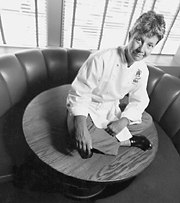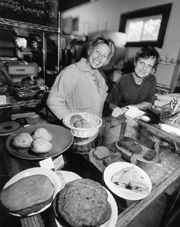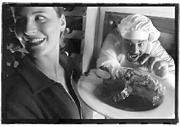Adrift in the fog of my first few months of parenting, I was surprised to discover how uncannily similar it was to writing. Neither came easily. Both required enormous energy and creativity; both rewarded the ego, but weren’t, in the end, about me at all. Both necessitated originality and authenticity. Both made me tired —too tired, for damn sure, to consider writing a book about the similarities between writing and parenting.
David Spangler, Issaquah’s own internationally known new-age guru (Revelation: The Birth of a New Age, A Pilgrim in Aquarius), ought to be too tired—he has four kids, ages 3 to 14, and a thriving career leading workshops and otherwise pursuing his calling as “a freelance mystic.” But when his publisher came asking him for an inspirational book for parents, a revisioning of the daily dirty work of parenting as a kind of mystical journey, Spangler had something he wanted to say.
Parent as Mystic, Mystic as Parent by David Spangler Riverhead Books, $21.95
Both parenting and “mysting,” as Spangler likes to call it, are concerned with calling forth and nurturing unseen potential: the mystic, the emergence of the sacred in the world; the parent, the emergence of the child’s true self. Spangler holds that both endeavors require the same skills—listening, fostering, confronting old baggage, letting go—and to these he devotes a chapter each.
Neither mystic nor parent, Spangler writes, can afford to lapse into autopilot. “Every good parent knows that his or her child is a unique individual who requires more than a by-the-book approach,” he observes. “You don’t have to be a mystic to understand this. But the essence of this understanding is the attitude with which a mystic approaches the world in striving to discover the essence within things—to go beyond the surface, beyond the apparent, beyond the automatic.”
Spangler’s mysticism lends him other parenting insights. Being both an “individual and a participant in a larger wholeness”—Spangler identifies this as one of his tenets as a mystic—teaches him that no one member of a family has a lock on wisdom. Just as the task of a mystic is “to listen for the stirrings of the sacred in the world,” a parent must listen to her child in the same intuitive way: “with my being and not just my ears.”
If this openness to the intangible and invisible, this “willingness to go where the senses cannot always take us,” is the business of the mystic, so it is the business of the parent who must ultimately throw up his hands and have faith in the emerging personhood of his child. In “Faith,” Spangler writes of his own father’s experience with this, when the collegiate David presented his plans to give up a scholarship in molecular biology to roam the world as a spiritual seeker. After some time (and with what must have been titanic restraint) the elder Spangler took David’s hands in his and told him to “be the best damned mystic you can be!”—a charge the writer recalls whenever he is tempted to exert too much control over his own children.
“Faith” is an elegantly written, affecting essay, in which Spangler reveals some of the episodes of his life that have given form to his philosophies. It’s also an anomaly in a book that is largely more interested in telling than showing. More than once—more than a dozen times, alas—I’ve scrawled a big “B” in the margin of Spangler’s book. It stands for blather.
The challenge of human life,” the mystic writes, “is to build a bridge over which the infinite and the universal may connect with the finite and particular, allowing the potentials of the former to blend with the energy of the latter in ways that benefit and uplift the whole of life.” Maybe you’re all nodding sagely and stroking your chins in agreement, but I’m afraid I need more help in discerning what this mess of abstraction means. Neither am I acquainted with the Beloved, an entity Spangler ominously invokes from time to time without definition.
Indeed, until he introduces the Zen principle of Beginner’s Mind on page 39 does Spangler offer any concrete spiritual concept at all. (After reading this book, I’m not even sure I know what a mystic is.) I have no doubt that Spangler knows; he seems like an intelligent guy who can wrap a paragraph around the numinous better than most.
Neither is his a woo-woo cloud-dwelling mysticism; whenever he tells a story about himself he’s down at the Starbucks slurping a mocha or making a mess of a soiled diaper or losing his temper with his children. Indeed, one of the nice things about this book is how folksy its author appears to be—notwithstanding the fact that it’s hard to repeatedly refer to yourself as a mystic without sounding a little almighty.
No, the problem is that by the end of the book Spangler has failed to convince me that parenting is any more uniquely like “mysting” than it is like retail sales or beekeeping or garbage collection. Like so many books these days, Parent as Mystic, Mystic as Parent reads more like the brainchild of a zealous publisher driven by marketing potential than a set of ideas that emerged organically and inevitably from the writer’s psyche; Spangler seems to work so hard uncovering every whiff of similarity between the two enterprises (both have two syllables!) that finally they don’t seem terribly similar at all.
But of course they are: Parenting is a little bit like mysticism, just as parenting is a little bit like writing. In my vast experience I can see that parenting is a little bit like a whole lot of things. Most will never have books comparing them, and that’s probably just fine.
Kathryn Robinson is a Seattle Weekly staff writer.







